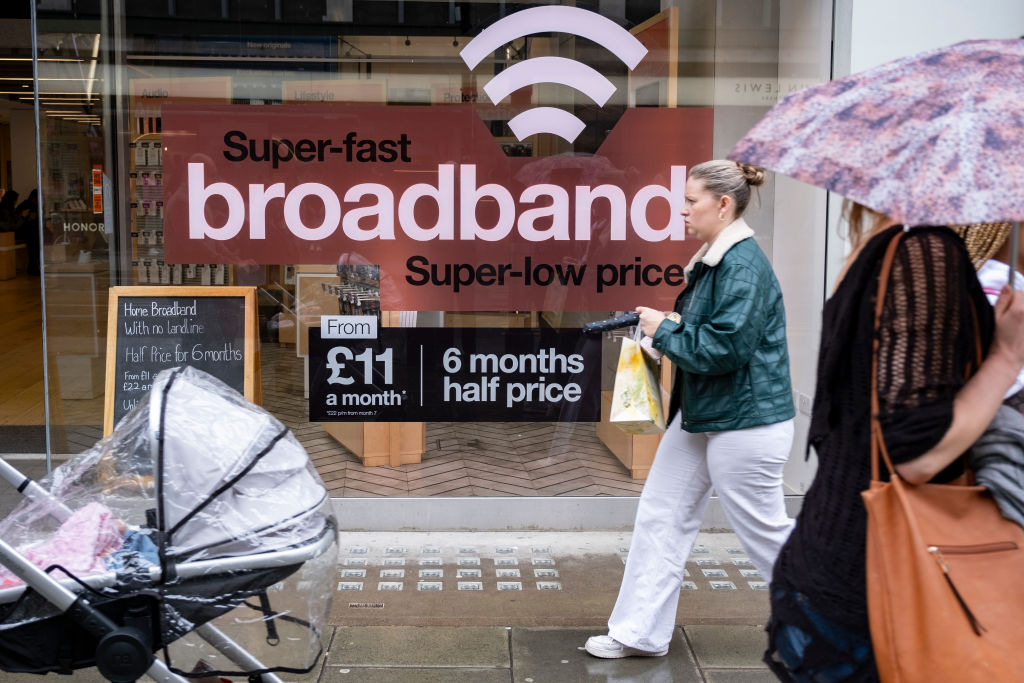Ofcom fibre broadband reforms to force providers to be ‘clearer’ about internet connection types
Providers currently use ‘fibre broadband’ as a catch-all term. But Ofcom wants them to give consumers greater clarity on whether they will get full-fibre or a partial connection.


Get the latest financial news, insights and expert analysis from our award-winning MoneyWeek team, to help you understand what really matters when it comes to your finances.
You are now subscribed
Your newsletter sign-up was successful
Want to add more newsletters?

Twice daily
MoneyWeek
Get the latest financial news, insights and expert analysis from our award-winning MoneyWeek team, to help you understand what really matters when it comes to your finances.

Four times a week
Look After My Bills
Sign up to our free money-saving newsletter, filled with the latest news and expert advice to help you find the best tips and deals for managing your bills. Start saving today!
Fibre broadband providers will be forced to provide greater clarity about the type of connection they provide customers with under new Ofcom rules.
The guidance, which was brought in on Monday (16 September), will crack down on the use of the term ‘fibre’. The regulator said the word was being used “inconsistently” by the telecoms industry, “leading to confusion” among consumers.
Now, providers will have to be “clear and unambiguous” about whether their network uses fibre connections that run all the way into homes. Such connections offer the fastest possible internet speeds. Some providers claim they offer ‘fibre’ when this is only true for sections of the cabling that runs into homes.
MoneyWeek
Subscribe to MoneyWeek today and get your first six magazine issues absolutely FREE

Sign up to Money Morning
Don't miss the latest investment and personal finances news, market analysis, plus money-saving tips with our free twice-daily newsletter
Don't miss the latest investment and personal finances news, market analysis, plus money-saving tips with our free twice-daily newsletter
It comes as the telecoms regulator has clamped down on inflation-linked contract rises for mobile and broadband customers. Firms now have to spell out future price hikes in pounds and pence at the point of sale. Ofcom has also tightened the rules around data roaming charges for UK tourists heading abroad.
Ofcom fibre broadband clampdown: ‘providers must use clearer terms’
The regulator will now force broadband providers to spell out what sort of technology they use to provide internet to your home. At present, firms use the word’ fibre’ as a marketing ploy given it suggests they’re providing the internet via fibre optic cables - the type of connection which offers the fastest, most secure internet on the market.
However, while millions of households benefit from full-fibre connections, where the fibre optic cables run all the way into the property from the local exchange, many only have slower partial fibre connections. In these instances, fibre cables may only run up to just outside a home with copper wires taking over for the rest of the journey.
Ofcom wants these two different types of connection to be more clearly defined by providers at the point of sale, before a final purchase is made, and then in the contract summary. It has suggested they use links that will take their customers through to explainer pages which spell out what different internet options mean for them. The regulator has said any explanations should be in accessible language.
Gigabit broadband coverage set to expand
Ofcom’s new rules come after it revealed gigabit broadband - connections that offer speeds of 1,000 megabits per second (MBPS) or higher - could be available in almost all areas of the UK by 2027. In a report published earlier in September, the regulator said gigabit-capable, full-fibre coverage could be open to 97% of homes (roughly 29 million) across the country. At present, around 19 million homes can access this sort of broadband connection.
While 99% of urban households could get fast internet access by 2027, the coverage for rural areas will be less expansive. Ofcom estimates 88% of properties in the countryside will have speedy broadband by the same end date.
Get the latest financial news, insights and expert analysis from our award-winning MoneyWeek team, to help you understand what really matters when it comes to your finances.
-
 Should you buy an active ETF?
Should you buy an active ETF?ETFs are often mischaracterised as passive products, but they can be a convenient way to add active management to your portfolio
-
 Power up your pension before 5 April – easy ways to save before the tax year end
Power up your pension before 5 April – easy ways to save before the tax year endWith the end of the tax year looming, pension savers currently have a window to review and maximise what’s going into their retirement funds – we look at how
